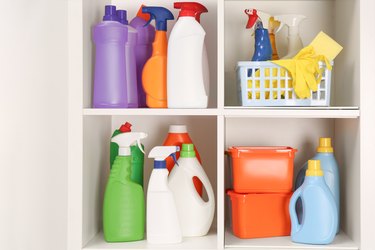
Common household cleaners bleach and ammonia are both popular, effective, and inexpensive, but they are not interchangeable. Bleach is a powerful disinfectant best used on fabrics, while ammonia cleaning is great for cutting through grease and grime on surfaces. Understanding where and when to reach for bleach vs. ammonia will help you make the most of these powerful cleaning agents.
Differences Between Bleach and Ammonia
Video of the Day
Bleach is created from chlorine, caustic soda, and water. Its composition makes it a strong disinfectant best used on mold and bacteria. When using bleach, this compound must always be diluted since it is incredibly powerful and harmful in excess. Many people reach for bleach when they are trying to get stains out of their laundry or are simply interested in brightening their whites. Disinfecting high-traffic areas, wiping up spills on kitchen countertops, and cleaning dishes are also great moments to reach for bleach-based products. The downside of bleach, though, is that it can cause discoloration or lightening, so it should always be used sparingly at first on less-visible test areas.
Video of the Day
Ammonia, on the other hand, is a nitrogen-based cleaner made up of three hydrogen atoms and one nitrogen atom. While not as strong a disinfectant as bleach and less likely to lighten surfaces, ammonia cleaning is best used for removing grease and grime on surfaces, like stove tops, glass, electric ovens, carpet stains, bathroom tiles, and most jewelry. Where jewelry is concerned, you won't want to reach for ammonia when cleaning foil-back jewelry, glued jewelry, and some antique jewelry because it can be too harsh and can cause damage.
Ammonia is also wonderful at absorbing unwanted smells or deterring pests. Many pests register ammonia as smelling like their predators, so keeping a small bowl of it near problem areas, like trash cans, can keep mice, raccoons, and other animals at bay. Some ammonia cleaning products formulated specifically for stain removal and countertop cleaning come premixed with soap, while other ammonia-based products meant for cleaning windows and other surfaces come clear.
In terms of treating laundry with ammonia cleaning products, stains on nylon, cotton, and polyester will likely lift after soaking for 30 minutes in a solution of water, dish soap, ammonia, and baking soda. However, more delicate fabrics, like silk and wool, should never be treated with ammonia, as it's too harsh and can eat away at their fibers.
Never Combine Bleach and Ammonia
If you buy clear ammonia but want to create a more sudsy solution, you can do so by mixing it with a few drops of soap or detergent. However, under absolutely no circumstances should you ever combine ammonia with bleach. When combined, bleach and ammonia create a lethal, toxic gas that is incredibly dangerous. Always check the ingredients in the cleaning products you're using before you concoct any new mixtures.
Precautions When Using Both Bleach and Ammonia
Whether you're cleaning with bleach or ammonia, you should always use each product sparingly and protect your skin from direct contact. Both of these powerful cleaning products can be dermal irritants. Neither of these products should be inhaled in excess, so ventilate your indoor spaces as much as possible when cleaning with either bleach or ammonia.
Always keep these products out of the reach of children, as they can be incredibly dangerous. Additionally, never clean your gas oven with ammonia without turning off your gas line and pilot light. Mixing ammonia with gas is another combination you definitely want to avoid.